Disclaimer: This post may contain Amazon affiliate links. Sudachi earns a small percentage from qualifying purchases at no extra cost to you. See disclaimer for more info.
Featured Comment:
“it is funny how I always made my own bread crumbs from leftover bread and which that’s what a panko bread crumbs are. but then again probably the difference is that I bake them in the oven to get them dried to last longer in the cupboard. thanks for the info. -“never stop learning'”
– Ed
What Are Japanese Panko Breadcrumbs?
Panko breadcrumbs are light and flaky Japanese-style breadcrumbs. When it comes to the term “panko,” it’s not anything complicated or technical. Pan (パン) is the Japanese word for “bread,” and “ko” (粉) can be translated as “powder” or, in this case, “crumb.”
So technically, panko is just another way to say breadcrumbs or can be translated as Japanese-style breadcrumbs in English. But how are they different from Western breadcrumbs? That’s the question.
Panko vs Regular Breadcrumbs: How is Panko Unique? What’s So Special?
So, are there any differences between panko and regular breadcrumbs? Linguistically, there aren’t, but a few things are unique to Japanese panko.
One of them is “raw breadcrumbs”. In Japan, raw breadcrumbs (nama panko) were created using Japanese-style white loaf (shokupan), suitable for yoshoku dishes such as tonkatsu and ebi fry.
Saying “raw” means using bread in a normal fresh state, not roasted or dried.
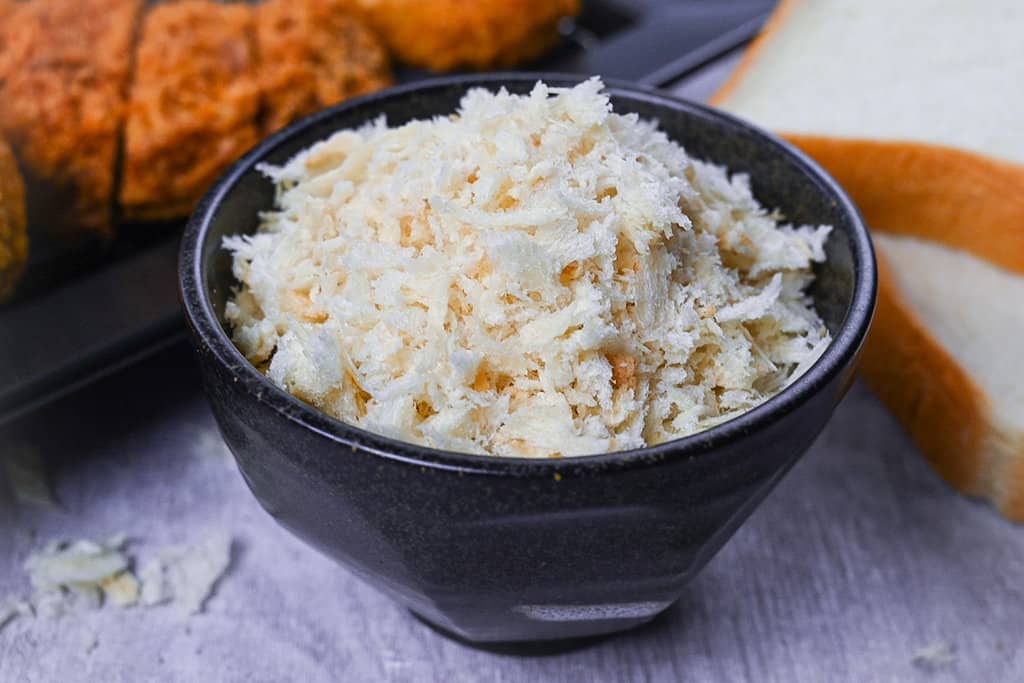
When raw panko is used for frying, the moisture in the breadcrumbs is quickly replaced by the oil, and the fine air bubbles give the breadcrumbs a crispy, light texture.
Raw panko tends to be bigger than regular breadcrumbs as well. However, they absorb oil well, so their calorie content tends to be higher than dry breadcrumbs.
This breadcrumb style became popular and created various uniquely Japanese-yoshoku dishes such as ebi fry, tonkatsu, and korokke.
So, traditional Japanese panko is raw breadcrumbs, not dry ones.
Differences Between Nama Panko and Dried Panko
So, the fresh panko breadcrumb is unique to Japanese cuisine, but what’s the difference between a fresh one and a dried one? That’s right, many people still use dried panko breadcrumbs at home!
Where are the differences besides the obvious difference between fresh and dried? Let’s check it out.
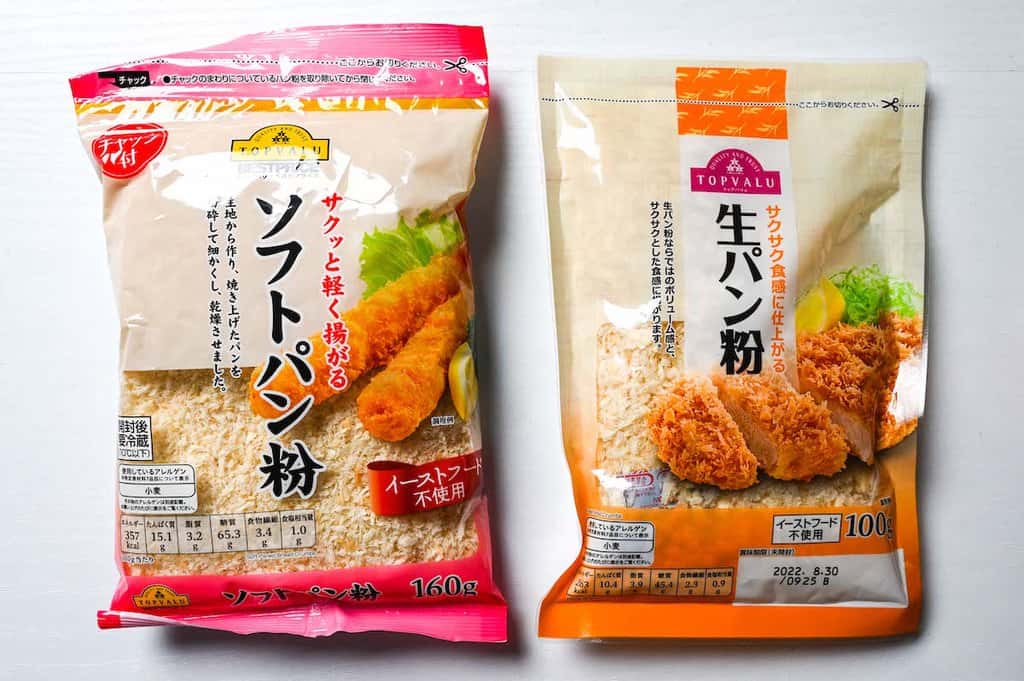
| Dried panko | Fresh panko | |
|---|---|---|
| Size of crumb | Smaller | Bigger |
| Heat penetration | Faster | Slower |
| Storage | Long shelf life | Spoils quickly |
| Texture | Crispy | Extra crispy |
| Recommended | korokke, kushiage | ebi fry, tonkatsu… |
The general rule of thumb is that fresh panko is typically used to coat raw ingredients, such as raw pork for tonkatsu and raw shrimp for ebi fry.
But it’s just general talk. You can interchange these two types of panko as you like!
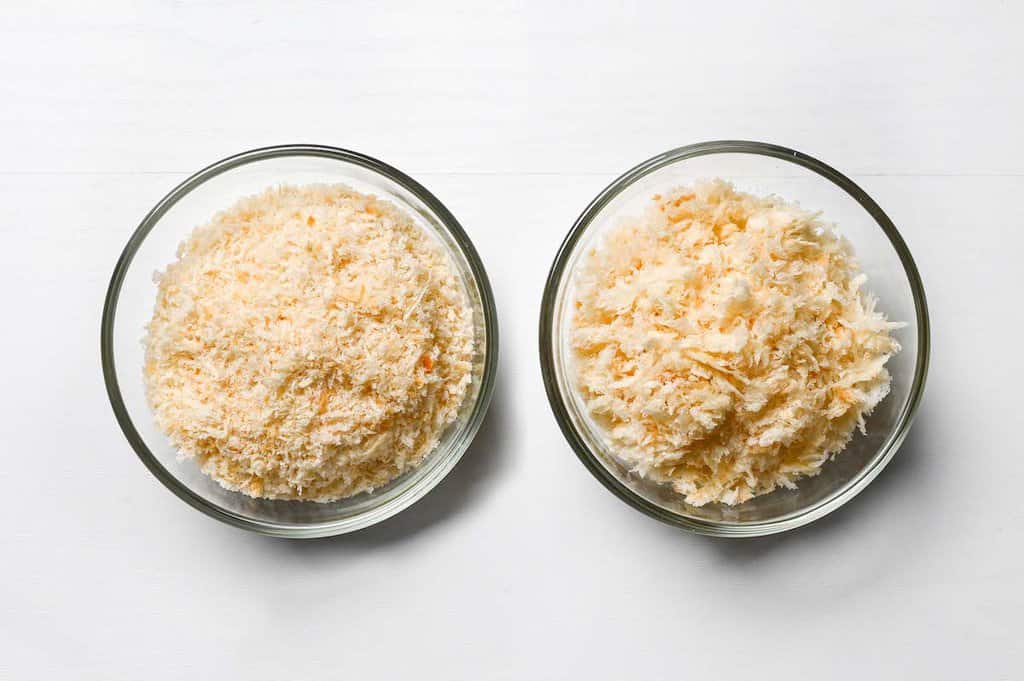
Why I Never Buy Packaged Panko Anymore
Until recently, whenever I made deep-fried dishes with panko breadcrumbs, I bought packaged panko as it’s not an expensive product, at least in Japan. However, I never buy them anymore. Why? Firstly, the package always contains at least 100g. I end up with leftovers taking up space in my freezer.
Making homemade panko is 10 times easier than driving to a supermarket. All you need is some leftover bread; it doesn’t have to be shokupan!
One purpose of making this panko breadcrumbs 101 is to explain how easy it is to make panko at home and how you can use almost any kind of bread available. I mean, initially, breadcrumbs were made as a way to use up leftover bread, right? Let’s keep the tradition and spirit!
To make this post more interesting, I also experimented with making homemade panko with different kinds of bread I had at home, ranging from baguettes to English muffins.
You know what? They both turned out to be excellent. But first, let’s explain how to make panko breadcrumbs before getting into the experiment.
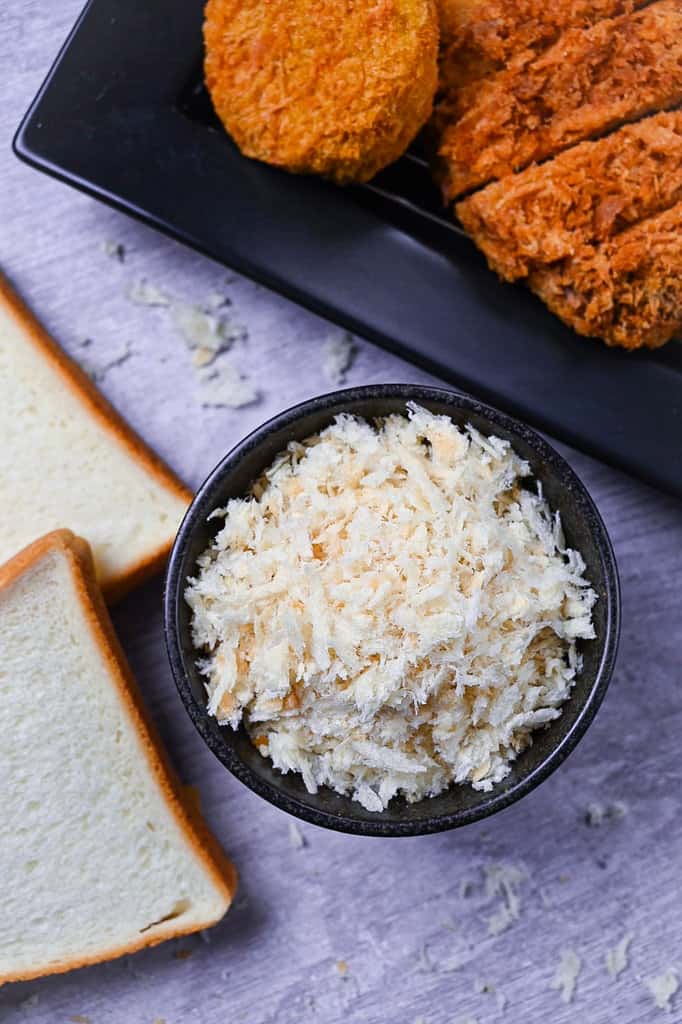
3 Ways to Make Homemade Panko Breadcrumbs
As I said, making homemade panko breadcrumbs is much easier than you imagine! In this section, I will explain 3 easy ways to make Japanese-style panko breadcrumbs at home! When the desired fineness is achieved, the product is ready.
Straight into a food processor
This way is the most straightforward. You can roughly cut your leftover bread and put it in a food processor. How long does it take? Honestly, within a minute! The longer you run the food processor, the finer and smaller the panko will be.
The texture of big, fluffy breadcrumbs is more crunchy than crispy when fried. They are more satisfying to eat. As I mentioned before, the bread can be fresh. You don’t need to dry it out or use stale bread for this.
Grate frozen bread
This is an alternative way, especially for someone who usually freezes leftover bread or doesn’t have a food processor. Bread is just frozen here, so it will still be fresh panko!
The key to making panko with a grater is ensuring the bread is fully frozen. It won’t be easy to shave if it is even slightly soft.
I would also recommend cutting the bread into pieces and freezing it beforehand, as it is easier to hold in the hand and does not melt quickly at body temperature.
Making dried panko
Even if you want dried panko breadcrumbs, it’s not hard to do! You can take dried (stale) bread and throw it into the food processor or grate it like above. Dried panko tends to be finer with smaller crumbs.
The Best Bread for Making Panko
In conclusion, you can make panko breadcrumbs with almost any kind of bread as long as it doesn’t contain fillings or sauces. Don’t go and buy expensive shokupan to make panko!
Use what’s available in the kitchen! But I know seeing is believing. So, I did some panko experiments with 3 kinds of bread (somewhat unique) I had at home.
- Baguette
- Japanese “hotel-style” shokupan loaf
- English muffin
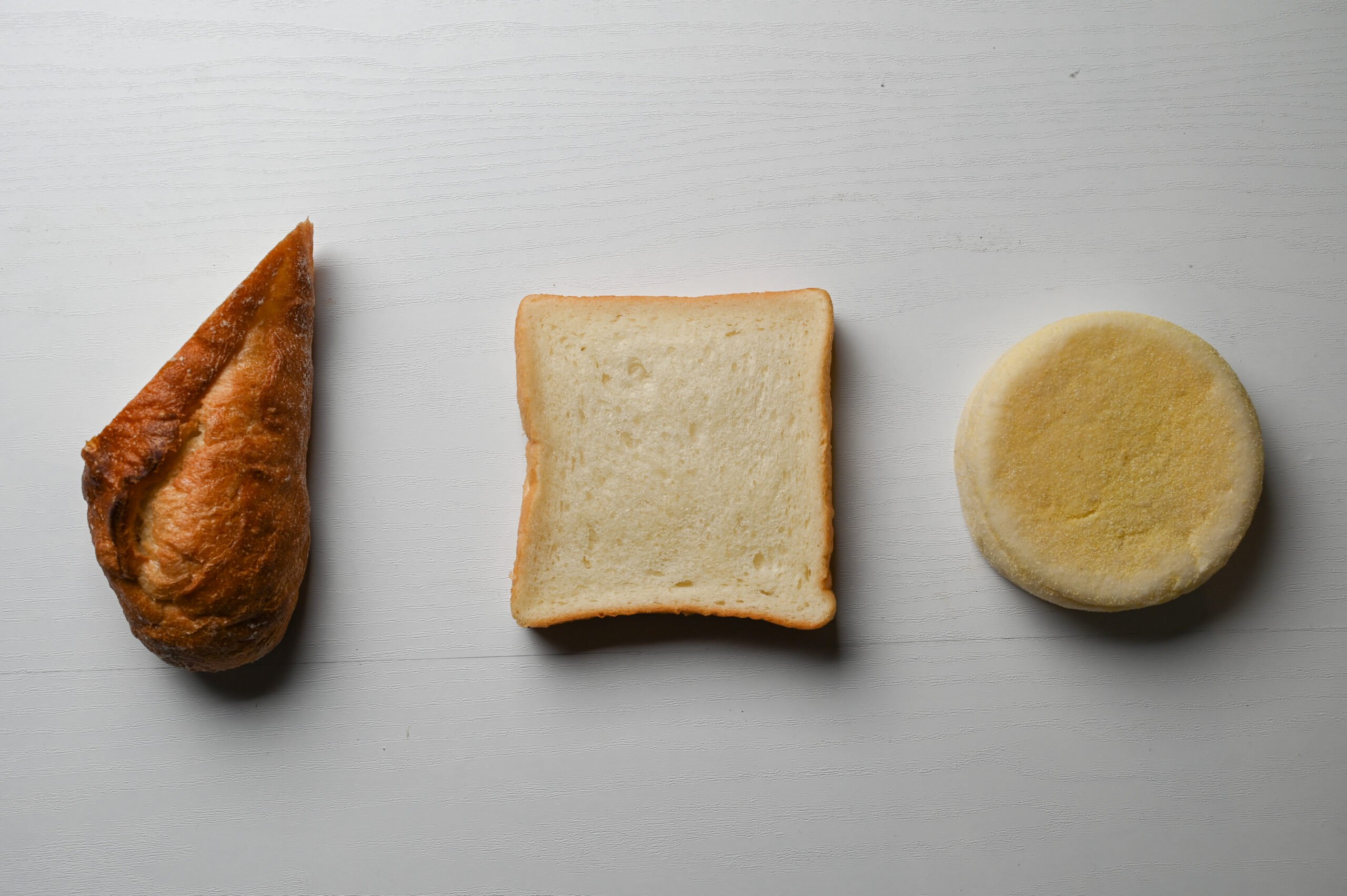
I chose the food processor for the method of making breadcrumbs in this experiment. I can re-confirm that it will be ready in 30 seconds!
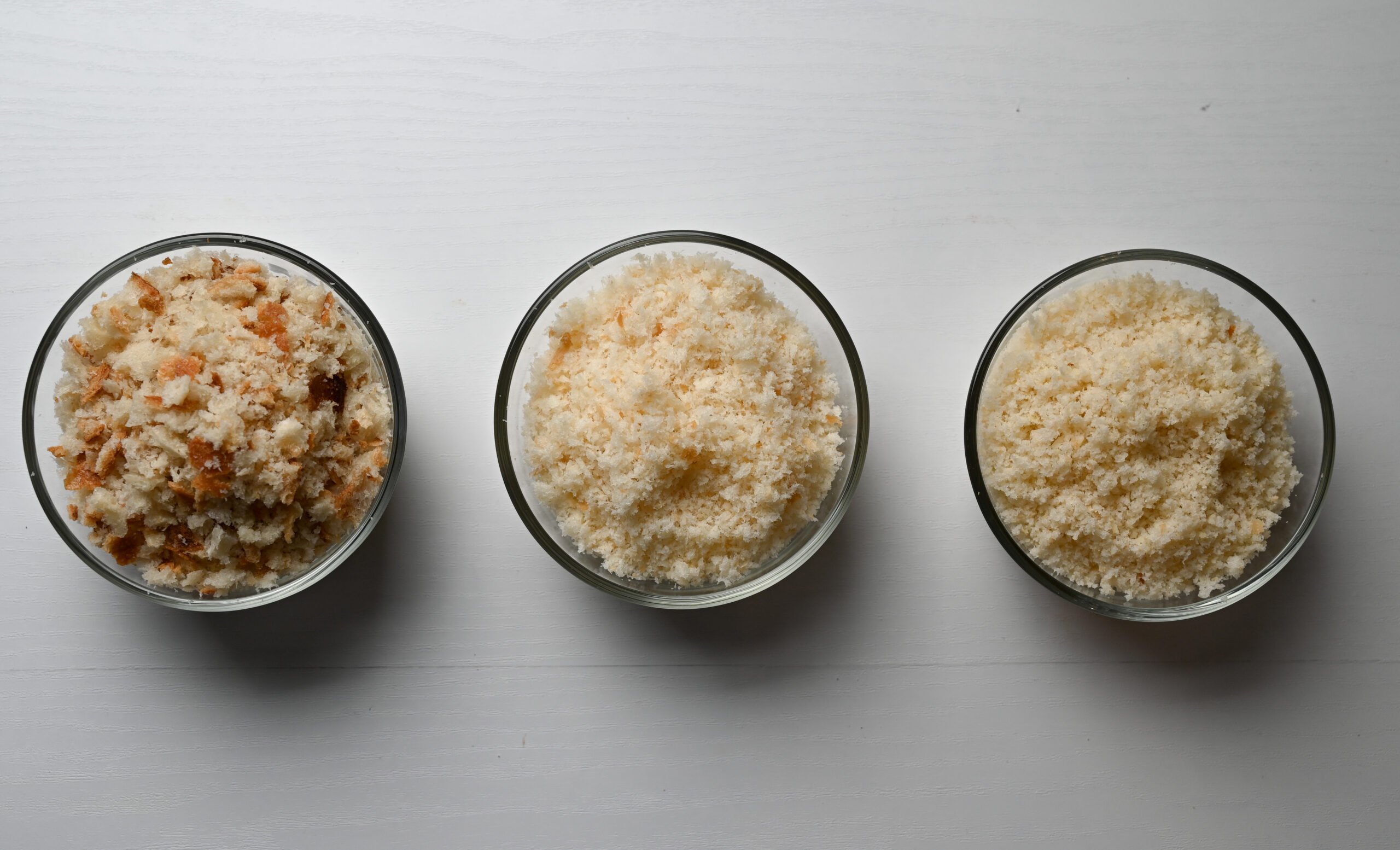
Then, I deep-fried pork to make hire katsu with each homemade panko in this experiment. Below is the result!
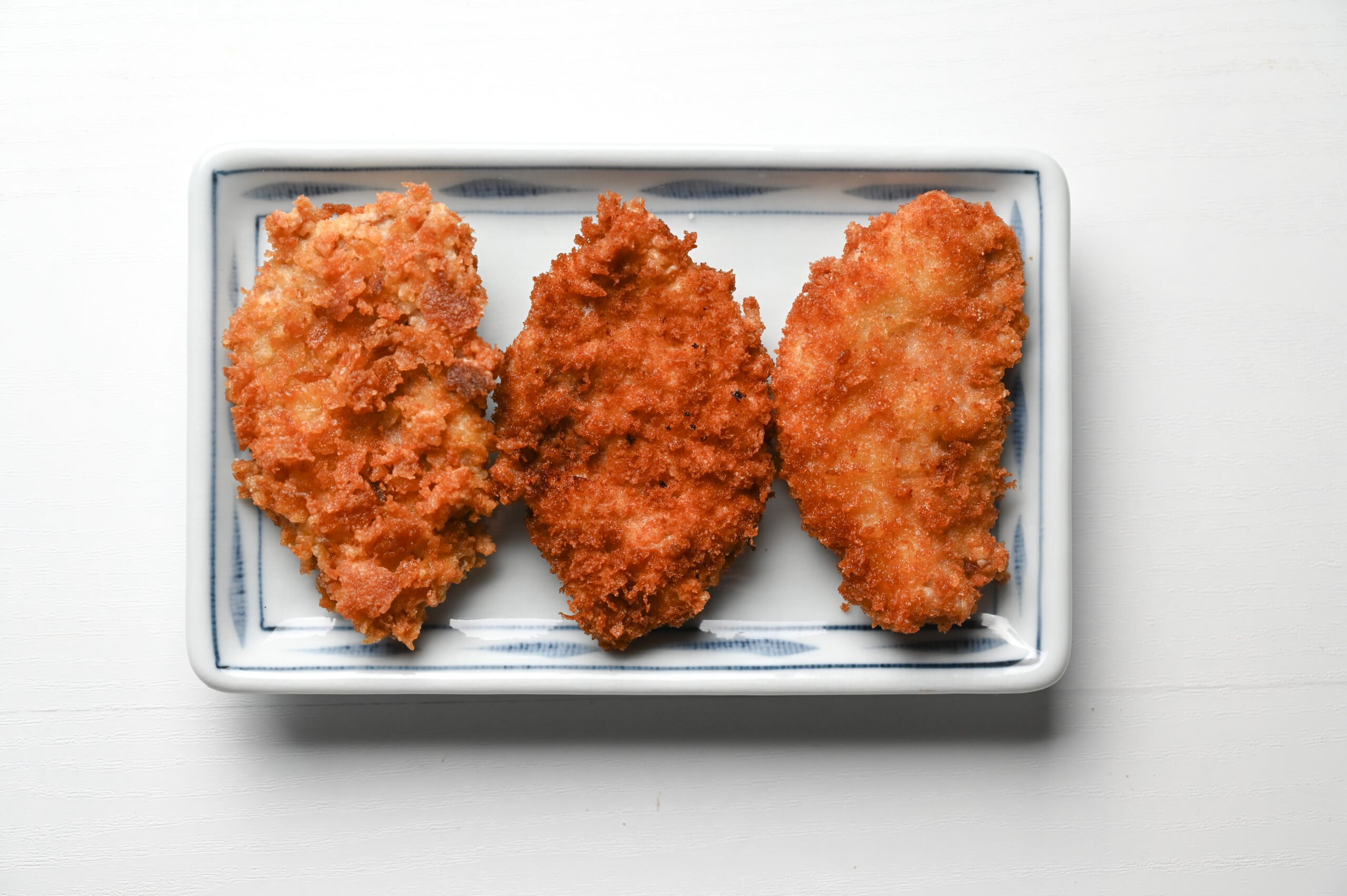
Surprisingly, my favorite of all three was baguette panko! The crust of the baguette became really crunchy, and its texture was almost like a crunchy cracker snack attached on the outside. You can’t make that heavy, crunchy sensation with any other two.
On the other hand, Japanese-style loaf and English muffin panko breadcrumbs were somewhat similar. The only significant difference was that the English muffin panko was a bit finer and paler, a little more like dry panko.
Nonetheless, they both tasted amazing and did the job of panko breadcrumbs properly.
After this experiment, I was intrigued about what would happen with other kinds of bread. If I try something new, I will keep adding it here.
But until then, here are the other bread ideas for homemade panko:
- Whole grain bread
- Focaccia
- Soda bread
- Brioche
- Rye bread
- Ciabatta
- Pita
- Bagel…etc
The beauty of this is you can use any leftover bread!
FAQ
In a usual sense, it’s not gluten-free. However, using this homemade panko recipe and gluten-free bread, you can make your own panko!
Storage time for homemade panko breadcrumbs is simple. Homemade breadcrumbs are made from bread literally, so the shelf life is the same as bread.
If you make too much but don’t intend to use the leftovers soon, store it in the freezer for 2 weeks to 1 month for good flavor.
However, the best practice would be to check the packaging of the bread (if you use store-bought bread) and follow the expiry date once it’s open. I personally keep the leftovers in a zip-lock bag and store them in the freezer.
Nonetheless, it is still essential to use them as quickly as possible.
The texture of the result will be different, but those two are interchangeable. However, dishes like katsu and ebi fry are very different as you can only achieve their iconic flakes using panko.
No, you cannot use flour instead of panko. The result will be completely different, and many dishes will end up failing. If you want to substitute panko, you must use other breadcrumbs.
Oatmeal and cornflakes can also be substitute ingredients. Corn flakes are more recommended as a substitute ingredient because they are easier to use than oatmeal. If you use cornflakes, put them in a bag and crush them by hand. Please note to use non-flavored cornflakes only.
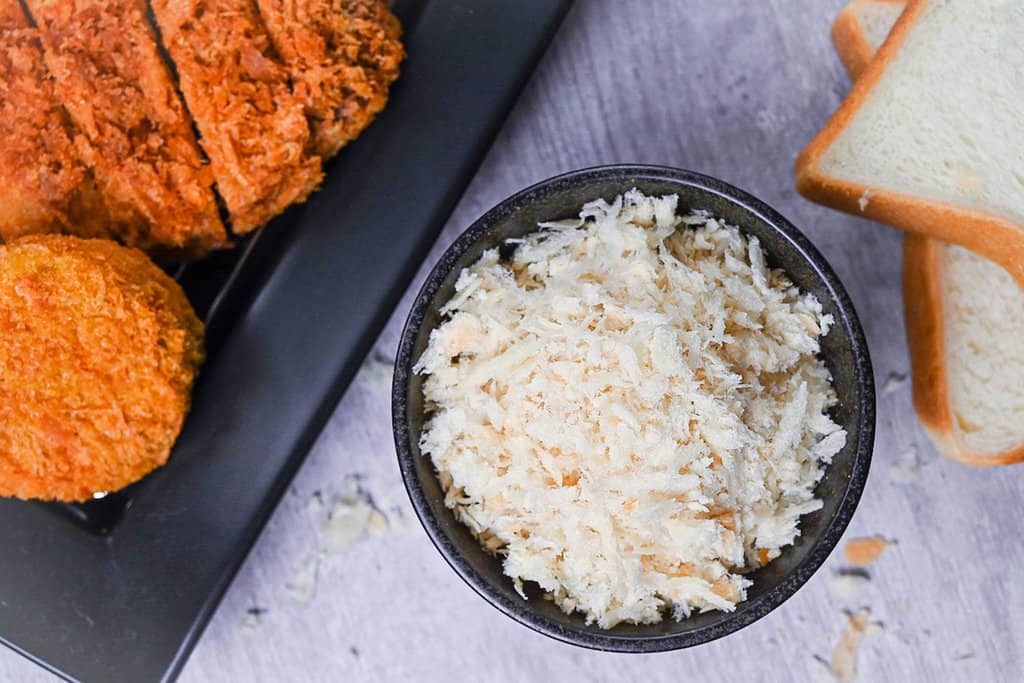
I hope you enjoy this Panko Breadbrumbs recipe! If you try it out, I’d really appreciate it if you could spare a moment to let me know what you thought by giving a review and star rating in the comments below. It’s also helpful to share any adjustments you made to the recipe with our other readers. Thank you!
10 Japanese Recipes Using Homemade Panko
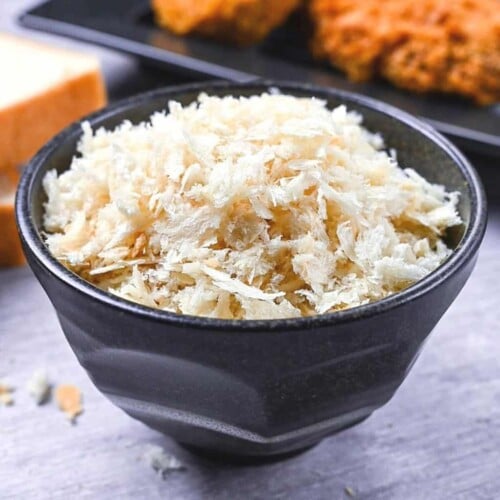
Homemade Japanese Panko Breadcrumbs
Ingredients
- 2 slices white bread
My recommended brands of ingredients and seasonings can be found in my Japanese pantry guide.
Can’t find certain Japanese ingredients? See my substitution guide here.
Instructions
Method 1 (Food Processor/Blender)
- Cut 2 slices white bread into rough cubes.
- Place the cubes in the food processor / blender and blitz for a few seconds. (Don’t blitz for too long or the panko will be too fine.)
Method 2 (freeze and grate)
- Cut the bread slices into 3-4 pieces and place them on a tray.
- Place the tray in the freezer for 2-3 hours or until the bread is completely frozen.
- Take one piece of bread from the freezer and grate using a grater with large holes.
- Repeat until all of the bread is grated into panko breadcrumbs.
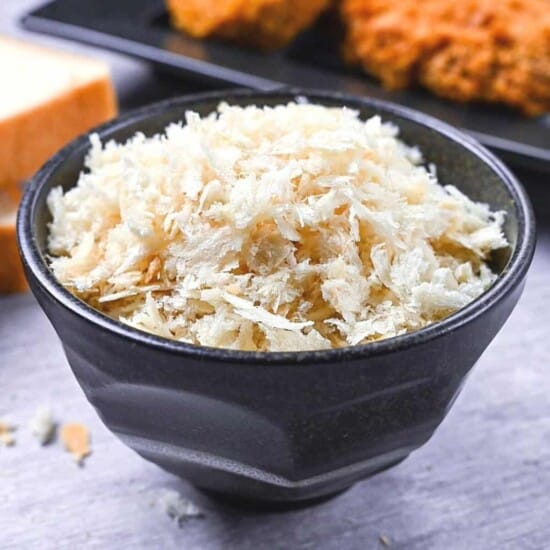


is it fine if I use newly opened store bought bread or do I have to do something before I blitz it??
Hi Vel, it’s fine to use newly opened bread, you don’t need to do anything to it. Thanks for your question!
Hi Yuto
Don’t the breadcrumbs have to be oven baked before storing them?
Thank you
Hi Veronica,
There’s no need to bake the breadcrumbs before storing them. In fact, Japanese panko breadcrumbs are usually either soft (made with fresh bread and called “nama panko”) or dried, I haven’t heard of oven baking breadcrumbs here. I recommend storing them in the freezer if you don’t plan to use them within the next few days.
Thank you for your question. Hope this helps!
Hello,
I was wondering if I have to cut the crusts off the bread before shredding? I’ve read somewhere that this must be done otherwise the crust pieces of panko will too dark when fried. Do you find this to be true?
Hi, thank you for your question! Cutting the crust off is optional but I personally leave it on and even many store-bought options include the crust. If you check out the “Can you make panko with any types of bread?” section of this post, you can see that I used the crust and it didn’t make a huge difference in the color of the final result. I don’t think it makes it too dark, but it does make it a little darker (and crispier). Thanks again!
it is funny how I always made my own bread crumbs from leftover bread and which that’s what a panko bread crumbs are. but then again probably the difference is that I bake them in the oven to get them dried to last longer in the cupboard. thanks for the info.
-“never stop learning’
-Ed.
Hi Ed,
Thank you for your comment! 🙂
I love that you always make breadcrumbs out of leftover breads! I’m always interested in hearing about your chef experiences!
Yuto